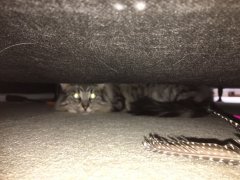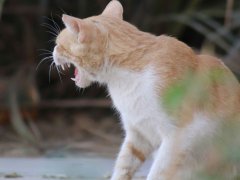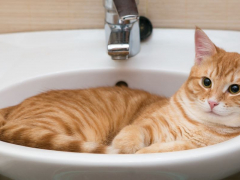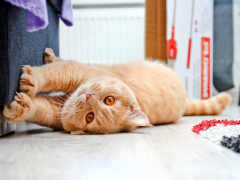
Facing a hissing cat is an unpleasant, and if we’re honest, slightly intimidating prospect! All cat owners would, of course, rather experience the purring cuddle or welcoming meow that we’re more familiar with from our furry friends.
Cats hiss at people or other pets if they are feeling defensive, scared, or irritated, or if they are experiencing pain or discomfort. If a cat is more bonded with one person, they might be less comfortable with other family members. A sudden increase in hissing, especially when being handled, can be a sign that a cat is in pain and needs veterinary attention.Key Takeaways
Hissing is a warning in the language of cat behavior and is usually a sign of fear or discomfort. Cats hiss at people or other pets if they are feeling defensive or scared, or if they are in an unfamiliar environment and agitated. Pain, irritation, and discomfort can also play their role.
If your cat is hissing at a family member—or you—it’s important to understand the reasons behind why cats hiss, and how we can help them. All cat people just want what’s best for their feline, and a cat hissing is not normally a happy cat. Learning about why your cat may be hissing will help you find a solution and create a more harmonious household.
Let’s look at the common reasons for this feline danger signal, and how we can diffuse the situation.
What Is A Hiss?
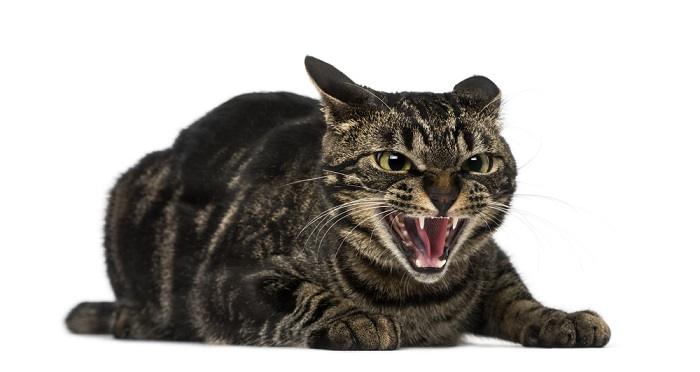
A hissing cat might also display wide-open eyes, an arched back, and fluffed-out tail.
Hisssss! This snake-like noise that cats make is made by a sudden expulsion of air through the mouth. The mouth is open, with teeth bared and on show. The threatening noise might be paired with changes to your cat’s body language, such as wide, staring eyes, a fluffed-up tail, and an arched back.
Also Read: How To Tell If A Cat Is Angry
Why Is My Cat Hissing?
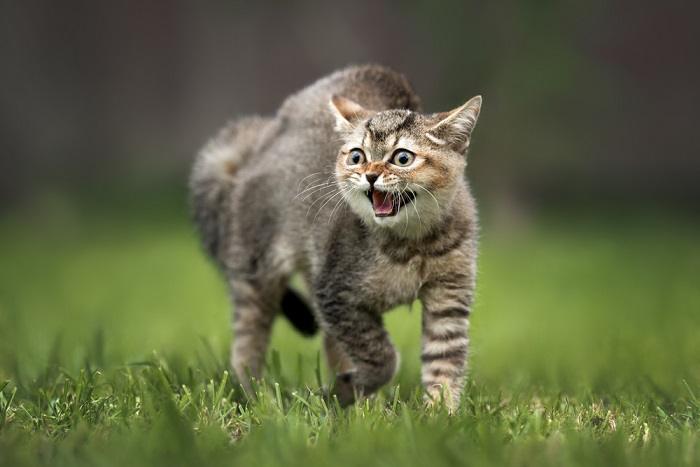
Hissing is more often a sign of fear than of aggression.
Hissing is a perfectly normal cat behavior and is instinctual in certain situations. It is often thought of as a sign of aggression and can be one of the precursors to a physical fight. However, the most common cause is fear.
Examples of your cat being scared and hissing may include if they come across a new cat in their territory, a new pet (such as a new kitten) is brought into the home or they are picked up and handled when they don’t want to be.
A cat at the vet is a classic example of a normally peaceful cat turning into a hissing ball of fluff due to their fear of being restrained by an unfamiliar person in an unfamiliar and scary place.
Although fear is the main driver for this behavior, there are some more general scenarios in which behaviorists have noted hissing as a prevalent feature.
Also Read: 8 Ways To Help a Scared and Fearful Cat Be Confident
1. Cat To Cat Hissing
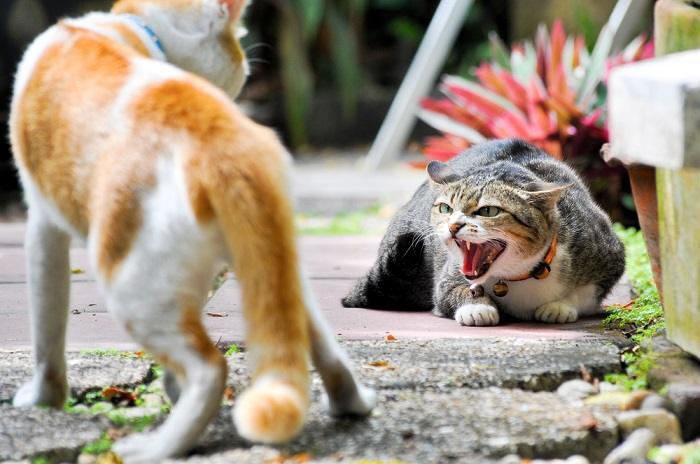
Cats hiss at each other as a warning to stay back or stay out of their territory.
Cats might hiss at another cat if scared, and this defensiveness can escalate to aggression. Outdoor cats may hiss to warn other cats away from their territory (most common in unneutered male cats), and indoor cats may hiss at another pet in the household encroaching into their space.
Another reason for cats to hiss at each other is to do with hormones—a male cat may hiss at an unneutered female cat if looking to mate.
Also Read: How Much Does It Cost Spay or Neuter A Cat?
2. Mother Cats
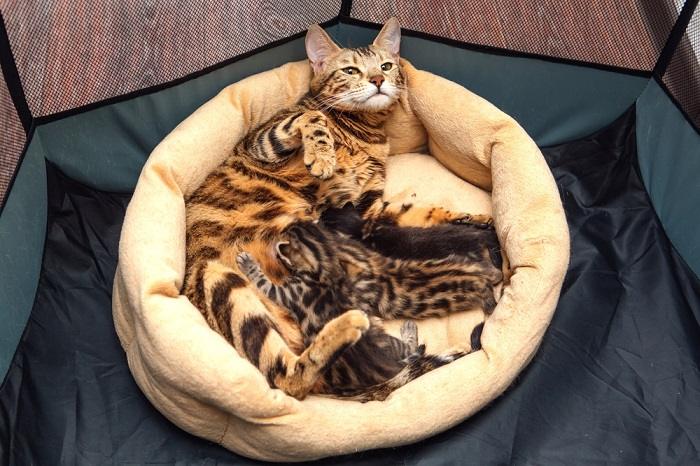
Queens are extremely protective of their young kittens and often hiss to remind people to keep their distance.
Cats are protective of their kittens and will warn any potential threat away. Mother cats may hiss if a person, or other pet, approaches when they have young kittens, especially if they are still nursing.
Also Read: How To Tell If A Cat Is Pregnant: Labor Signs, Behavior And Timeline
3. Hissing At People
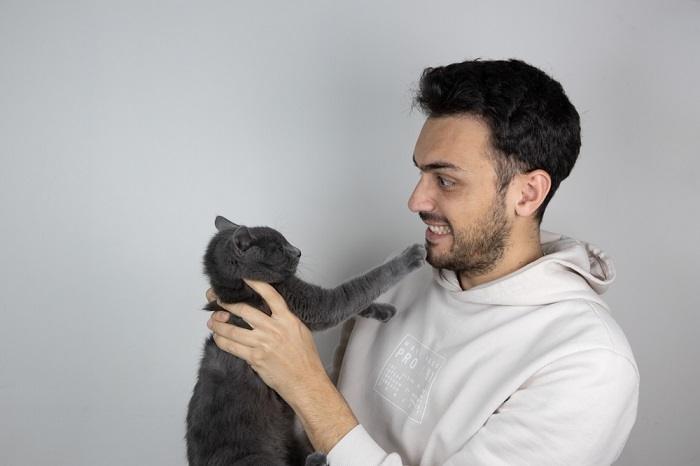
Hissing is a clear sign a cat is not comfortable or happy, so it’s important to figure out what’s causing it.
If your cat always hisses at your husband, it may seem like your cat hates them! This isn’t true, but hissing at a person usually indicates that your cat feels uneasy around them. Perhaps they are being picked up when they don’t want to be, or maybe it is something as minor as their scent or the sound of their voice.
Feline body language is often very subtle, and it can be hard for those not well-versed in cat communication to pick up on early signs that a cat is uncomfortable, leading to the cat escalating to more overt signals such as hissing.
This might occur when a person tries to cuddle a cat that doesn’t want to be petted or approaches a cat that is busy eating or grooming. Cats often prefer one person in the household, and can be quite vocal if a non-favorite tries to ingratiate themselves!
Also Read: 7 Common Cat Vocalizations And What They Mean
4. Pain, Discomfort, Or Irritation
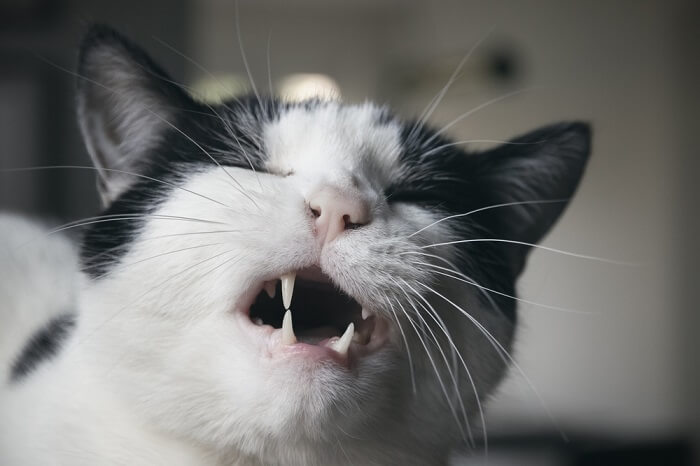
A sudden increase in hissing, especially when being handled, can be a sign that a cat is in pain.
A hiss can be a natural reaction to pain or discomfort. For example, if you own an old cat who has some degree of arthritis, they might become uncomfortable with being handled or groomed and begin to hiss at you if you try.
Chronic pain can be difficult to detect in cats, so any behavioral change such as a sudden dislike of being handled warrants a vet visit. Older cats might suffer from a variety of medical complaints that can cause discomfort, or just cause them to be more irritable.
Also Read: What Can You Give A Cat For Pain? 6 Vet-Recommended Options
How To Respond When Your Cat Hisses
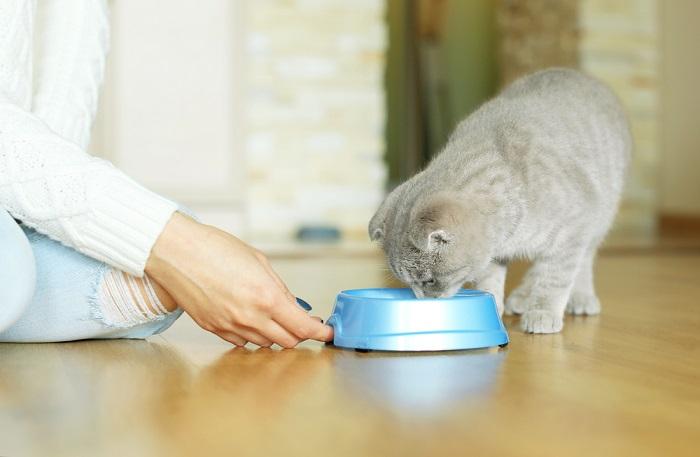
To encourage a scared cat to come out of hiding, offer some favorite food.
If your cat is hissing, whether at your husband, you, a family member, or a pet, they’re giving you a strong signal that they’re unhappy and stressed. The first thing to do is to give your cat space and some time to calm down.
If you are restraining them, let them go if safe to do so, and back away. Ensure they have an escape route from their current situation, access to a safe hiding space, and then leave them alone, preferably for a few hours.
When some time has passed and hopefully, they have calmed, try coaxing them out, perhaps with your cat’s food, some treats, a catnip toy, or some gentle encouragement. Try and add in lots of positive reinforcement if they come out of hiding—praise, gentle stroking, treats, or playtime.
Also Read: 8 Purrfect Games You Can Play With Your Cat
The occasional hiss at someone or something is perfectly normal, but if your cat is regularly getting upset, this indicates something might be amiss with their environment, or they might have some underlying stress or pain. A check over with a veterinarian is a good first step, to rule out any chronic health issues or discomfort.
Think about whether you can improve your cat’s environment to reduce stress. They should have free access to key resources such as a litter box, food, water, and a safe place to sleep.
Add in plenty of enrichment, such as puzzle feeders and cat trees, and consider a pheromone diffuser such as Feliway to cover their environment in calming, safe pheromones. If you think your cat is struggling to cope with stress or anxiety, consult a qualified animal behaviorist.
Also Read: The 7 Best Calming Cat Treats
Cat Hissing: Final Thoughts
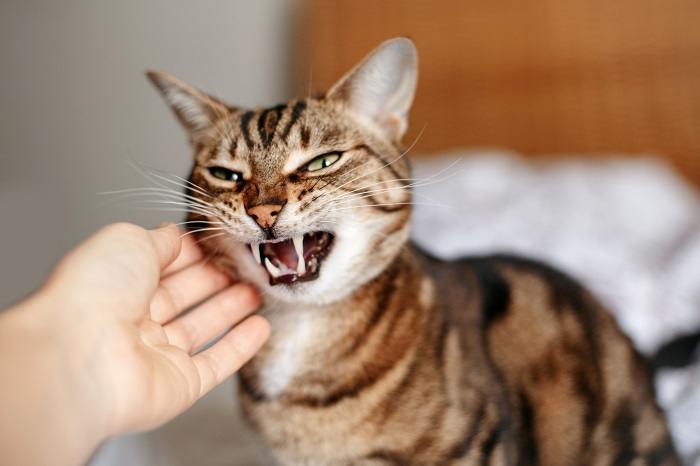
If a cat is more bonded with one person, they might be less comfortable with other family members.
Is your cat hissing at your husband? This isn’t necessarily a sign that your cat is behaving aggressively. Cats usually hiss when they are feeling scared or stressed. If your cat is more bonded to you, they might just be less comfortable with another family member, or anxious about them invading their space.
Try and avoid situations where your cat feels fearful, reduce stressors in their environment, and give plenty of positive attention such as playtime, treats, and company. Make sure to get your cat checked over by a vet for any underlying pain or illness.
Also Read: Why Does My Cat Like My Husband More Than Me?
Frequently Asked Questions
Why does my cat keep hissing at my husband?
Cats hiss when fearful, unsure, or feeling defensive. Your husband might be accidentally encroaching into a safe cat space, or perhaps he just smells, sounds, or feels wrong.
Why does my cat hiss at a certain person?
Your cat might be feeling scared or wary if the person is unfamiliar. Some cats are averse to certain scents and sounds, and they dislike anything new entering their territory.
Why does my cat hiss at my partner but not me?
Cats often bond strongly with one person in the household. If your partner is less known to them, they may hiss to guard their territory against an unfamiliar person and be feeling anxious or defensive.
How do I get my cat to like my husband?
Cats usually bond with the people who provide for their needs. Get your husband involved in feeding, grooming, playing, and spending time with the cat to improve their relationship.

